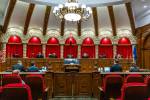Gibbons signs budget bill; lawsuits filed to block state from taking water funds
CARSON CITY -- Amid concern that legal action could put state spending in the red again, Gov. Jim Gibbons on Friday signed the bill that reduces spending by state agencies, raises fees and makes other changes to cover a revenue shortfall of more than $800 million.
Gibbons signed Assembly Bill 6 about the same time Clark County's regional Clean Water Coalition and M Resort in Henderson filed separate lawsuits challenging the state's right to tap $62 million collected for a shelved wastewater project in the Las Vegas Valley.
The Clean Water Coalition money and $25 million in Clark County School District capital funds were included in the budget-balancing bill signed by the governor.
Lawyers for the coalition and M Resort argue that the state lacks the authority to take the money because the funds were collected from valley residents and businesses specifically to address regional water quality issues.
An analysis by the Legislative Counsel Bureau reached the opposite conclusion.
Senate Majority Leader Steven Horsford, D-Las Vegas, said the coalition was one of several accounts that were "swept" by lawmakers, a maneuver that yielded about $190 million to help balance the budget and protect education and other vital services.
Under the state constitution, Nevada must have a balanced budget.
Horsford said he was "disappointed" by the coalition's decision to sue, since the agency's own board recently decided its proposed wastewater project was no longer needed.
"They themselves indicated they were going to use those funds for a purpose other than what they were collected for," Horsford said. "It's hard for me to understand why they would now put our entire state budget process in jeopardy."
M Resort Chief Executive Officer Anthony Marnell III said he decided to file suit because he and others paid money into the coalition exclusively to fund water quality improvements in the valley. If the money isn't going to be used for that purpose, "it should be returned to the people who paid into the fund," he said.
Marnell said his company has paid about $1.5 million in sewer connection fees to the Clean Water Coalition, and that's where he wants that money to stay.
"Everybody who lives in Southern Nevada knows how big the water problem is. And if they don't they should," he said. "I don't think that's how the state should do business."
If the effort to block the fund transfer is successful, Horsford said the governor might have to call another special session of the Legislature to find an alternate way to balance the budget.
"We will have to deal with it," Gibbons said about the lawsuits. "It would be my goal not to have another period where we have to call the legislators back (into special session)."
Instead, he hopes to be able to address any deficit that may occur through executive action.
Under the worst-case scenario, Horsford said, the budgets for K-12 and higher education would be cut by another 3.5 percent so the Clean Water Coalition could keep $62 million for a project it doesn't intend to build.
The Clark County Water Reclamation District and the cities of Las Vegas, Henderson and North Las Vegas formed the coalition in 2002 to develop a pipeline that would carry treated wastewater from the valley's sewage plants to a spot at the bottom of Lake Mead.
The coalition board recently suspended preliminary work on the $860 million project because declining growth and advances in sewage treatment have reduced the need for it.
The budget measure signed Friday called for the coalition to hand over the money that day, but state Budget Director Andrew Clinger said earlier that the funds would not be taken before the next fiscal year, which begins July 1.
If a judge issues a restraining order blocking the state from taking the funds, then Clinger said the governor might ask the Legislature's Interim Finance Committee approval to make $62 million in other cuts without calling the Legislature into another special session.
The Legislature does not begin its next regular session until February 2011.
In signing the budget-balancing bill, Gibbons called it "the best thing we can do for Nevada at the current time."
He spent many hours behind closed doors with legislative leaders in developing the bill.
To cover the shortfall, the state also is taking $25 million from a Clark County School District capital improvement bond program.
Associate Superintendent Joyce Haldeman acknowledged that she and Superintendent Walt Ruffles agreed to the transfer of the school district's funds to the state.
"The choice was between that or facing additional cuts," Haldeman said. "Why worry about using the funds for remodeling schools if you don't have money to pay for teachers?"
She acknowledged that some of the funds will be used for other parts of the state, although most ultimately will end up in Clark County, which has more than 70 percent of the state's population.
The bill was approved by the Senate 20-1 and the Assembly 34-8 during the special session that ended March 1.
Under the bill, state agency spending over the next 16 months was cut by $305 million and $197 million was taken from various state agency trust accounts.
In addition, the bill uses $114 million in federal funds to cover the shortfall and raises $53 million through fee increases on mining claims, banking and those charged to incorporate business in Nevada.
To keep state parks open, visitors will be charged higher entrance fees.
Casinos will pay an additional $4.2 million through higher costs for licensing investigations.
And the state Athletic Commission will charge more in gate and broadcast fees for licensing boxing and other events.
"Government is reducing its size," Gibbons said. "We have fewer employees than in 2007."
While the spending shortfall facing the state was identified by Gibbons at $887 million when he convened the special session on Feb. 23, he and legislators pared that figure down to $805 million. The lower figure resulted from the mining industry paying much more than anticipated in state taxes on March 1.
The net proceeds of the mineral tax was not increased, but the higher tax payments came naturally through the soaring prices being paid for gold. Gold sold for $1,102 per ounce Friday.
Gibbons already has come under fire from former federal Judge Brian Sandoval for raising the fees and for signing another bill Thursday designed to take sales taxes paid by Clark County residents and use the funds to set up a highway construction bond program for transportation projects statewide, creating jobs to help the state's ailing economy.
"His analysis is completely wrong," Gibbons said about Sandoval, one of his opponents in the June Republican primary for governor.
The fees are designed to have users of state services pay the costs of providing those services, the governor said.
Contact Capital Bureau Chief Ed Vogel at evogel@reviewjournal.com or 775-687-3900. Contact reporter Henry Brean at hbrean@reviewjournal.com or 702-383-0350.























